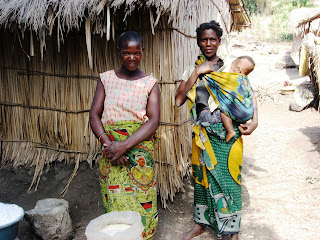Sorry, everyone, for being such a lame blogger. Posting one
blog every month or two is probably not the best way to develop a following,
but I greatly appreciate anyone who stuck it out and is reading this extremely
belated second blog. At this point, most people in my life know that I’m living
in Malawi, but many people probably don’t know what I’m doing in Malawi. When asking what I would be doing for
work, Ryan’s brother Adam said he assumed it would be something Captain
Planet-y. Clearly, anything involving the planeteers and a lesser known
superhero wearing red underpants outside of his tights would be way cooler than my
actual job. Still, I figured I should elaborate a bit on what job could be
important enough to make me move thousands of miles away from my husband,
family, and friends.
I remember a friend of mine at work asking what I would be
doing in Malawi. I explained that I would be working with an international development
organization called PCI to help some of the most marginalized people in the
country learn conservation agriculture practices, develop resiliency against disasters,
practice better health and nutrition habits, and participate in village saving
and loans programs. “Oh,” she said. “So you’ll be teaching people how to live.” I
didn't know what to say to that. Surely I wasn't teaching people how to live! Spending
three months in Malawi four years ago as a glorified intern definitely didn't qualify
me to be an expert on how people should be living in rural Malawian villages. I
imagined how I would feel if someone just as random – say, a Korean businessman
– came into my home in America and told me how to live. “Take your vitamins!”
he would say, or, “save more money to prepare for unforeseen circumstances!” Ryan
already tells me both of these things on a pretty regular basis . . . ask him
how well I've complied J
Yet isn't this exactly what I would be doing? The crux of
development work is promoting behavior change – teaching people how to live healthier,
more productive lives; telling people to take their vitamins and save their
money so that they can invest in their futures. My first few weeks in my new
job, I was very uncomfortable with this whole concept of behavior change. Most
people who know me know that I am not a huge fan of advice (even applicable, thoughtful
advice that, if taken, would probably improve my life). In the end, I am
hopelessly independent and determined to make my own mistakes, often to my own
detriment (sorry, Mom!). Why would these communities be any different? Why
would these communities want to listen to anything I had to say, especially as I am a privileged mzungu who couldn't possibly comprehend the challenges they face?
What I learned was that I wasn't to teach anything to these
communities. In fact, most of our Malawian office staff members weren't directly
teaching anything to the community members either. Like many development
organizations, PCI uses a “training of trainers approach,” where our program
managers work with field staff, called facilitators, who in turn work with
volunteers in our communities. These volunteers, who receive a small stipend
for their work, are from the communities themselves and are ultimately the
voices that are heard in the villages.
Moreover, I began to understand that the programs we
implement seek to develop skills and build knowledge, in addition to promoting behavior
change. I am well aware that I should be taking my vitamins and saving more of
my income because of the extensive education I've received and the multitude of
resources at my fingertips. Rural villagers in Malawi, however, don’t have
access to books on nutrition or financial planning services. New mothers aren't
taught to only feed their newborns breast milk for the first six months of
their lives. Farmers don’t know how to mulch or inter-crop with legumes to increase
soil fertility. Communities don’t innately know how to organize themselves into
village banking systems to take impossibly small monthly contributions and
build enough capital to start new businesses that can sustain their children’s
lives. This is what PCI’s programming teaches them to do.
On one of my first trips out to the field, I met with some
of PCI’s program beneficiaries. I met Martha
who learned from PCI how to grow chilies and sell them at a profit three times
what she could earn growing and selling maize. I met Evelyn, who saved enough
money through her village saving and loan group to buy tin sheets to replace the
thatched roof on her house and start a cake making business. I met many mothers
who proudly showed me healthy and well fed children because they now use hand washing "tippy-taps" to prevent the spread of disease and they plant home
gardens to raise local crops as an extra source of nutrition and to sell for
extra income. Turns out, the only things I do in the communities are listen,
learn, and document.
So what do I do in my job? I write a bunch of reports and review a lot
of budgets. I oversee our staff members and remind them to submit their programming
updates to me on time. I review our monitoring and evaluation systems and make
sure our donors understand the impact of the projects they are funding. And on my favorite days, I get to go out to
the communities and talk to people about what their lives are like, what they
are doing differently today than they were four years ago when our programs
first started, and how their lives have improved due to new knowledge, skills . . . and changes in behavior.






